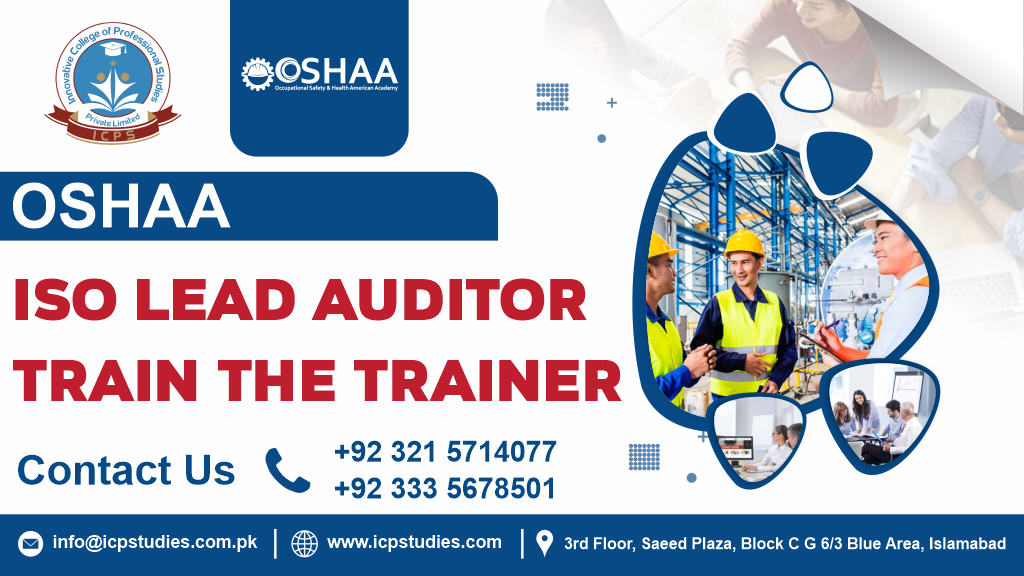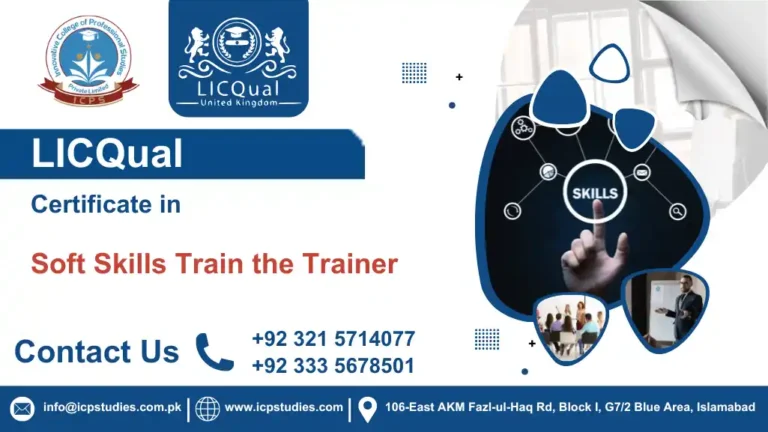In today’s rapidly evolving business environment, organizations must adhere to high standards of quality, safety, and compliance to maintain operational excellence. One of the most effective ways to ensure this is by conducting thorough, ISO-compliant internal audits. For businesses aiming to elevate their auditing capabilities, the OSHAA ISO Lead Auditor Train the Trainer course offers the perfect opportunity to acquire the skills and certification needed to lead and train others in conducting ISO internal audits.
The OSHAA ISO Lead Auditor Train the Trainer course is designed for professionals who want to master ISO auditing principles and learn how to train others to become skilled ISO auditors. This comprehensive program covers the requirements of ISO standards (such as ISO 9001, ISO 14001, ISO 45001, and others), auditing techniques, risk management, and the development of effective training programs. Upon successful completion, you’ll be equipped with the knowledge and tools to lead internal audits, manage audit teams, and deliver training to other auditors within your organization.
The OSHAA ISO Lead Auditor Train the Trainer course is designed to ensure that participants develop both auditing expertise and the ability to train others. The course covers essential ISO standards, audit planning, execution, reporting, and corrective actions. Additionally, it provides in-depth instruction on adult learning theories and effective training techniques.
The OSHAA ISO Lead Auditor Train the Trainer course is an invaluable opportunity for professionals looking to develop advanced auditing and training skills, ensuring ISO compliance and driving continuous improvement within their organizations. By equipping yourself with the tools to lead audits and train others, you’ll play a key role in your organization’s success in maintaining high-quality standards and operational excellence.
All About OSHAA ISO Lead Auditor Train the Trainer
Course Overview
The OSHAA ISO Lead Auditor Train the Trainer course is a comprehensive training program designed for professionals who wish to develop advanced skills in ISO auditing and become effective trainers of internal auditors. This course is ideal for those looking to enhance their knowledge of ISO standards, auditing practices, and how to train others to conduct high-quality audits that ensure compliance, improve processes, and support continual improvement within an organization.
ISO standards, such as ISO 9001 (Quality Management), ISO 14001 (Environmental Management), and ISO 45001 (Occupational Health and Safety), are the backbone of modern quality, safety, and environmental management systems. This course provides you with an in-depth understanding of these standards and equips you with the tools and techniques needed to lead audits, manage audit teams, and train others to effectively assess compliance and drive improvement initiatives.
The course blends technical knowledge of ISO auditing with adult learning principles, giving you the ability to not only perform audits but also design and deliver training programs that empower others to conduct audits with the same level of expertise and confidence.
Whether you are an experienced auditor looking to enhance your training skills or a manager aiming to build a skilled auditing team within your organization, this course will prepare you to lead internal audits and deliver training programs that ensure ongoing ISO compliance and foster a culture of excellence.
Upon completion, you will be certified as an OSHAA ISO Lead Auditor Trainer, enabling you to lead audit teams, train new auditors, and contribute to your organization’s continuous improvement efforts through effective auditing and training programs.
Study Units
- Introduction to ISO Standards and Auditing
- Advanced Auditing Techniques
- Training Methodologies and Adult Learning Principles
- Developing Effective Training Materials
- Communication and Facilitation Skills
- Managing and Evaluating Training Programs
- Ethics and Professionalism in Auditing and Training
- Emerging Trends and Future Developments
To ensure participants are fully prepared for the OSHAA ISO Lead Auditor Train the Trainer course, the following entry requirements are recommended:
- Basic Understanding of ISO Standards: Participants should have a foundational knowledge of ISO standards (e.g., ISO 9001, ISO 14001, ISO 45001) or have completed introductory ISO auditor training.
- Prior Auditing Experience: A minimum of 2 years of experience in internal auditing or quality management systems is recommended to gain the most from the course content.
- Familiarity with Auditing Techniques: Experience with audit planning, conducting audits, and evaluating non-conformities is essential for understanding advanced auditing techniques covered in the course.
- Educational Background: A background in business, management, engineering, or a related field is beneficial but not mandatory.
- Communication Skills: Strong verbal and written communication skills are important for both auditing and delivering training to others.
- Commitment to Learning: Participants should be prepared to engage actively in course activities, including role-playing exercises, group discussions, and real-world case studies.
- Leadership or Supervisory Experience: While not mandatory, prior leadership or supervisory experience will be advantageous for those aiming to manage and guide audit teams effectively.
These prerequisites ensure that participants can make the most of the course and leave with the skills and confidence to lead audits and train others in ISO auditing best practices.
The OSHAA ISO Lead Auditor Train the Trainer course is designed for professionals across various industries who wish to enhance their auditing expertise and gain the skills to train others in ISO auditing practices. This course is ideal for:
- Internal Auditors: Those who are already performing internal audits and wish to enhance their skills and knowledge to become Lead Auditors and trainers for internal audit teams.
- Quality Managers: Professionals responsible for implementing and maintaining ISO standards in their organization and who need to train and guide internal audit teams.
- Compliance Officers: Individuals tasked with ensuring compliance with ISO standards and regulations, and who need to train others to conduct audits and manage non-conformities.
- Training Coordinators and HR Managers: Those involved in designing and delivering training programs for internal auditors within their organizations.
- Consultants: Quality management or ISO consultants looking to enhance their credentials and expand their service offerings by training other professionals in ISO auditing techniques.
- Operations Managers: Managers overseeing departments that need to be compliant with ISO standards and who need to build an effective internal auditing system.
- Leadership Roles in ISO Compliance: Anyone in a leadership position within an organization, such as senior managers or directors, who want to deepen their understanding of ISO auditing and become proficient in training others.
This course is perfect for professionals looking to elevate their auditing capabilities, develop a skilled audit team, and ensure long-term ISO compliance within their organization.
Learning Outcome
Learning Outcomes:
- Understand ISO Standards: Gain a solid understanding of key ISO standards (e.g., ISO 9001, ISO 14001, ISO 45001) and their importance in ensuring organizational compliance and effective quality management systems.
- Identify Audit Principles: Learn the core principles and objectives of ISO auditing, including the roles and responsibilities of internal and lead auditors.
- Master Key Terminology: Become proficient in the terminology associated with ISO standards and auditing processes to ensure accurate communication and documentation.
2. Advanced Auditing Techniques
Learning Outcomes:
- Audit Planning and Preparation: Develop detailed audit plans and create comprehensive checklists tailored to specific ISO standards, ensuring thorough audits that align with organizational goals.
- Execute Effective Audits: Apply advanced auditing techniques, such as conducting interviews, making observations, and reviewing records, to gather relevant audit evidence.
- Manage Audit Evidence: Accurately collect, document, and assess audit evidence to support audit findings, ensuring consistency and reliability in audit conclusions.
- Handle Non-Conformities: Identify and document non-conformities during the audit process and recommend practical corrective actions to resolve issues and prevent recurrence.
3. Training Methodologies and Adult Learning Principles
Learning Outcomes:
- Apply Adult Learning Theories: Utilize adult learning principles to design and deliver training that resonates with adult learners and meets diverse learning needs.
- Design Effective Training Programs: Create structured training programs with clear objectives, ensuring that they are engaging and directly applicable to participants’ professional needs.
- Implement Instructional Techniques: Use varied teaching methods to accommodate different learning styles, ensuring maximum engagement and comprehension among trainees.
- Assess Learning Outcomes: Evaluate trainee understanding and training effectiveness through assessments and feedback, making adjustments where necessary to improve learning outcomes.
4. Developing Effective Training Materials
Learning Outcomes:
- Create Comprehensive Content: Develop well-structured and relevant training materials such as manuals, presentations, and handouts to facilitate effective learning.
- Use Visual Aids: Integrate visual aids, multimedia, and other learning tools to support key training concepts and enhance participant engagement.
- Design Practical Exercises: Develop hands-on exercises, simulations, and role-playing scenarios to reinforce theoretical knowledge with practical application.
5. Communication and Facilitation Skills
Learning Outcomes:
- Effective Communication: Master communication strategies that ensure clarity and impact in conveying complex auditing concepts, while using active listening to address participant needs.
- Facilitate Group Dynamics: Manage group discussions and dynamics to foster collaborative learning, encouraging active participation and problem-solving.
- Motivate Trainees: Apply motivational techniques to keep trainees engaged and focused, ensuring they are inspired to adopt best practices in auditing.
6. Managing and Evaluating Training Programs
Learning Outcomes:
- Organize Training Sessions: Plan and manage all aspects of training, from scheduling and logistics to ensuring resources are available and ready.
- Evaluate Training Effectiveness: Assess the success of training programs through participant feedback, performance metrics, and post-training evaluations.
- Continuous Improvement: Use feedback and performance data to refine and improve training methodologies, materials, and delivery to enhance future training sessions.
7. Ethics and Professionalism in Auditing and Training
Learning Outcomes:
- Apply Ethical Standards: Understand and adhere to ethical standards in both auditing and training to ensure integrity, objectivity, and fairness.
- Exhibit Professional Conduct: Demonstrate professionalism in all aspects of auditing and training, maintaining a respectful, fair, and unbiased approach.
- Ensure Compliance: Follow industry regulations and standards to ensure that all audit and training practices are compliant with legal and organizational requirements.
8. Emerging Trends and Future Developments
Learning Outcomes:
- Recognize Emerging Trends: Stay up-to-date on the latest developments in ISO standards, internal auditing, and related industries to adapt and remain relevant.
- Adapt to Technological Advances: Leverage new technologies and tools that impact the auditing field, enhancing efficiency, accuracy, and effectiveness.
- Prepare for Future Challenges: Anticipate future challenges in ISO auditing and training, equipping yourself and others to stay ahead of emerging industry needs and practices.
These learning outcomes are carefully crafted to ensure that participants in the ISO Lead Auditor Train the Trainer course are fully equipped with the knowledge, skills, and confidence to not only perform audits but also design and deliver effective internal auditor training programs. Upon completion, you will be prepared to lead audits, mentor future auditors, and drive continuous improvement in your organization’s ISO compliance efforts.
FAQs about OSHAA ISO Lead Auditor Train the Trainer







